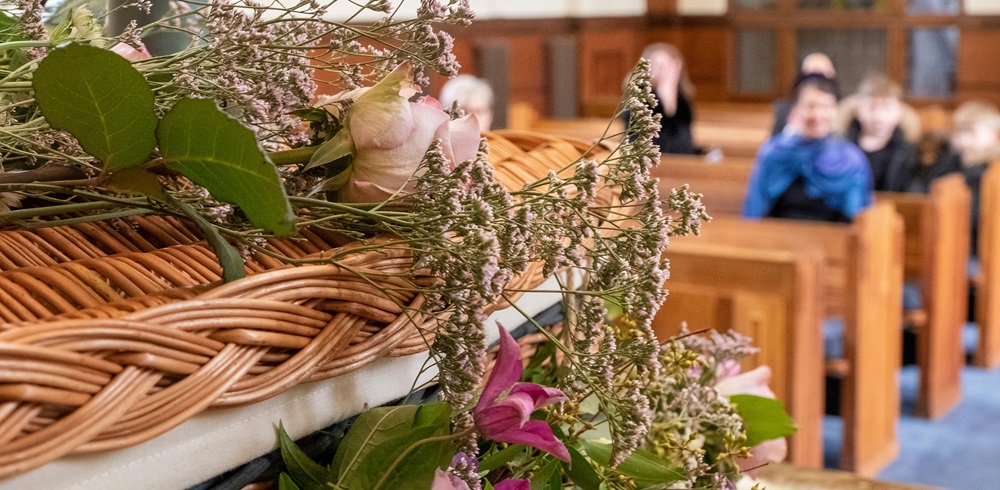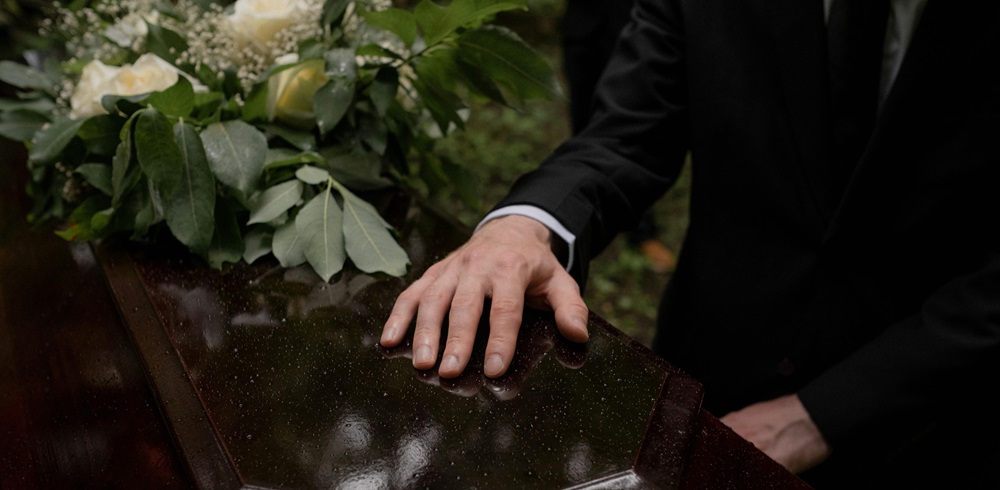
Advice on How to Plan a Funeral
Planning a funeral is never easy, but it is an important step in honouring the life of a loved one. Whether planning ahead or dealing with an unexpected loss, taking the time to understand the process can provide peace of mind during a difficult time.
By planning a funeral, you can ensure that your loved one’s wishes are respected, and the details are managed according to your preferences, easing the emotional and financial burden on your family.
In this guide, we will walk you through the steps of how to plan a funeral, from the initial decisions to the final arrangements. We’ll also cover key considerations, such as legal requirements and emotional support, and provide helpful tips for those planning a funeral for a parent or in other specific circumstances.
Planning can be an overwhelming task, but with the right resources and guidance, it doesn’t need to be.
Explore This Guide
- How Do I Plan a Funeral?
- Key Considerations of Planning a Funeral
- How to Plan a Funeral: Step-by-Step Guide
- How to Plan a Funeral in Specific Circumstances
- Resources and Support
How Do I Plan a Funeral?
The funeral planning process involves making both emotional and logistical decisions. From deciding whether to choose burial or cremation, to selecting a funeral director, the choices you make will ensure that the service reflects the wishes of the deceased and meets the needs of their family.
It’s important to begin by understanding the scope of what needs to be arranged. These decisions are often made with a funeral director who can guide you through the various options.
How Long to Plan a Funeral After Death
Typically, funerals in the UK are planned and held within two to three weeks after death. This timeframe allows for the necessary legal formalities to be completed, including obtaining the death certificate. It also gives friends and family time to make travel and accommodation arrangements.
If there are any special requests, such as a memorial service or specific location, additional time may be needed to make those arrangements.
How Far in Advance Are Funerals Planned?
While funerals are often planned on relatively short notice, it’s possible to plan well in advance. Some individuals choose to prearrange their funeral by selecting a prepaid funeral plan. This allows them to secure their funeral wishes and protect their families from rising costs by locking in today’s prices to avoid future price increases.
Planning in advance can also help ensure that the funeral service is tailored to specific desires, from the choice of service to the details of the ceremony. Golden Leaves provides a range of prepaid funeral plans, which can be tailored to meet individual needs.
We understand that funeral planning is an emotional journey. That’s why we offer dedicated support through the funeral process. Our team is available to answer your questions, guide you through the planning process, and help you explore prepaid funeral plans to secure your future and ensure peace of mind for your family.
Key Considerations of Planning a Funeral

Planning a funeral involves many emotional and practical decisions that can feel overwhelming. It’s essential to be aware of the key considerations that guide you through the process, ensuring that your plans align with both the deceased’s wishes and the family’s needs.
Emotional Aspects of Planning a Funeral
Losing a loved one is never easy, and the funeral planning process can be emotionally taxing. In addition to making practical decisions, you may also be navigating feelings of grief and loss.
It’s important to allow yourself space to process these emotions while still making the necessary arrangements. Seeking support from family, friends or grief counselling services can help ease the emotional burden. Additionally, many funeral directors are experienced in guiding families through planning with comfort and support.
Legal Requirements
There are certain legal steps you must take before proceeding with funeral arrangements. The most important is obtaining a death certificate.
A death certificate is necessary for many funeral-related tasks, such as registering the death, arranging burial or cremation, and managing the deceased’s estate. Without this legal document, funeral plans cannot proceed.
While the death certificate is typically issued by a doctor or hospital, some regions may require registration with the local registrar’s office. It’s important to check with local authorities to ensure that all legal requirements are met before you begin planning the funeral.
Can You Plan a Funeral Without a Death Certificate?
Technically, you cannot move forward with most funeral arrangements without the death certificate. The certificate serves as the legal confirmation of death and is required for a variety of formalities.
Some aspects of funeral planning can be prepared in advance, such as choosing a funeral director or deciding on burial or cremation. Once the death certificate is received, the remaining steps can be quickly put into motion.
How to Plan a Funeral: Step-by-Step Guide

Planning a funeral involves several key steps that need to be carried out in a logical and timely manner. Below is a step-by-step guide that will help you through the funeral planning process, making it more manageable and ensuring that you cover all essential details.
Step 1: Initial Decisions
The first decisions you’ll need to make are often the most significant. These will shape the overall direction of the funeral planning process:
- Burial or cremation?
Decide whether the deceased will be buried or cremated. If the individual has strong preferences, these should be honoured. If no preferences were expressed, consider discussing the options with family members to decide the best choice. - Which funeral director?
Choose a funeral director who aligns with your needs and the type of service you want to arrange. A funeral director can help guide you through the entire process, including creating an order of service.
Step 2: Plan Details
Once you’ve made the initial decisions, you can start planning the specifics of the funeral service:
- Choosing the service type
Will it be a traditional funeral, a memorial service or a more personal or unique ceremony? If the deceased has specific wishes for the service (such as a favourite location or type of ceremony), these should be incorporated into the plans. - Selecting the coffin or urn
Choose a coffin or urn that suits the type of service. Coffins can vary in style, material and cost, so it’s important to decide on one that aligns with your budget and the deceased’s wishes. - Funeral attire
Decide what the deceased will wear for the service and arrange any necessary clothing.
Step 3: Legal and Financial Arrangements
This stage involves managing the legal and financial aspects of the funeral:
- Death certificate
As mentioned earlier, obtaining the death certificate is a necessary step. Ensure it is processed and ready for use as soon as possible. - Will and estate
If the deceased had a will, ensure it is located, and any necessary legal processes are started. This may include notifying banks or other institutions. - Funeral plan
If the deceased had a prepaid funeral plan, ensure it is activated, and all details are confirmed with the funeral provider. If no plan was in place, you may need to set up a payment plan or cover the funeral costs directly.
Step 4: Notify Loved Ones and Arrange for Attendance
Once the funeral details are arranged, you’ll need to inform family and friends about the service:
- Notify close family and friends
Notify family members and close friends about the death and funeral arrangements. A funeral director can assist with this step if needed. - Public announcements
If you wish to inform the broader community, consider placing an obituary in the newspaper or posting it on social media, depending on the deceased’s wishes.
Step 5: Additional Considerations
In the final stages of planning, there are some additional aspects to consider:
- Post-funeral arrangements
If a wake or memorial is planned after the funeral, this will need to be organised. The funeral director can often assist with these arrangements. - Personal touches
Consider adding personal touches, such as special readings, music or a tribute to celebrate the life of the deceased. Many families choose to include photography or display memories at the service.
How to Plan a Funeral in Specific Circumstances

While the process of planning a funeral is generally the same for everyone, certain special circumstances may require additional considerations. These can include planning for a parent, dealing with unexpected deaths, or handling unique wishes or situations.
How to Plan a Funeral for a Parent
Planning a funeral for a parent can be an emotional and overwhelming experience, especially if it is the first time you’ve had to take on such responsibilities. In addition to the usual planning steps, there are a few other things to consider:
- Emotional impact: losing a parent is one of the most difficult experiences, and the grief you may feel can make decision-making challenging. It’s important to give yourself time to process your emotions, and if possible, involve siblings or other family members in the decision-making process to ensure that everyone’s wishes are considered.
- Family dynamics: when planning a funeral for a parent, it’s common to work closely with other family members, especially if there are differing opinions about how the service should be conducted. Try to ensure clear communication and make compromises where necessary, all while keeping the wishes of the deceased in mind.
- Estate and legal matters: in addition to planning the funeral, you’ll also need to consider the handling of your parent’s estate. This could include identifying the executor of their will, notifying banks and financial institutions, and understanding any outstanding debts or obligations that need to be addressed.
How to Plan a Funeral for an Unexpected Death
Unexpected deaths, whether from an accident, sudden illness or unforeseen circumstances, can complicate the funeral planning process. In these situations, the emotional shock may make it difficult to focus on the necessary arrangements.
Here are some considerations when planning a funeral under unexpected circumstances:
- Immediate actions: in the case of an unexpected death, it’s important to notify the authorities and make sure that any immediate steps are taken, such as obtaining a death certificate. If the deceased had no prior funeral plan in place, you may need to make quicker decisions regarding the type of funeral service.
- Autopsy and investigation: if the cause of death is unclear or under investigation, the funeral process may be delayed while an autopsy or inquiry is conducted. Work with your funeral director to determine when the service can proceed.
- Financial and legal planning: unexpected deaths may mean that no funeral plan was in place. You’ll need to consider the financial implications of the funeral and how payment will be arranged, either through personal savings or other means.
How to Plan a Funeral with Special Requests
Sometimes, the deceased may have left behind specific requests for their funeral, whether in a will or simply through conversations with loved ones. These can include requests for a specific service type, location or any other personal wishes, such as:
- Non-traditional funerals: some people may prefer a non-traditional funeral service, such as a celebration of life or a more informal gathering. If these requests have been made, work with the funeral director to ensure that their wishes are honoured.
- Green funerals: a growing trend in funeral planning is the option for ‘green’ or environmentally friendly funerals. These might involve biodegradable coffins, natural burial sites or other eco-conscious choices. These requests should be communicated clearly to your funeral director to ensure they are incorporated into the service.
Resources and Support
Planning a funeral can be an emotional and challenging experience, but you don’t have to do it alone. There are many resources and support networks available to help guide you through the process, whether you’re arranging a funeral for a loved one or prearranging your own.
Where to Find Help
- Funeral directors: funeral directors can provide support and guidance at every stage, from helping with legal requirements to coordinating the service details. Golden Leaves works with trusted funeral directors who can assist with both traditional and prepaid funeral plans, ensuring that the entire process is handled professionally and compassionately.
- Grief support services: there are many grief support organisations and helplines available to offer comfort during difficult times. Bereavement counselling can provide a safe space to process grief and navigate the emotional challenges of loss. Many funeral homes, including Golden Leaves, offer connections to grief counselling services for those in need.
- Financial and legal assistance: legal advisers and financial planners can help with managing the estate, handling debts or understanding funeral plan payment options. They will help you ensure that everything is taken care of according to the deceased’s wishes and within legal requirements.











